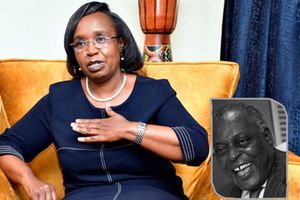
National Assembly chambers. Another showdown looms in Parliament pitting allies of ODM leader Raila Odinga against those of DP Ruto over the Elections (Amendment) Bill 2022.
| Jeff Angote | Nation Media GroupPolitics
Premium
Showdown looms as Ruto, Raila allies debate Election Bill
What you need to know:
- A total of 62 lawmakers voted against reduction of the publication period, with only 42 voting for it.
- Handshake team had to go back to the drawing board and prepare for the second reading of the Bill.
Another showdown looms in Parliament pitting allies of ODM leader Raila Odinga against those of Deputy President William Ruto over the Elections (Amendment) Bill 2022.
Signs that the Bill, which was introduced in the House yesterday afternoon, will be hotly contested emerged yesterday when allies of the DP ganged up and defeated a motion by Majority Leader Amos Kimunya seeking to reduce the period for publication of the Bill from 14 days to five.
Those opposed to the reduction of the publication period won on the global question, prompting the proponents to call for a vote.
A total of 62 lawmakers voted against reduction of the publication period, with only 42 voting for it.
“The results mean that the motion is defeated,” ruled National Assembly Speaker Justin Muturi.
Consequently, the Handshake team had to go back to the drawing board and prepare for the second reading of the Bill.
There were ugly scenes during the passage of the Political Parties Amendment Bill last year, when lawmakers allied to President Uhuru Kenyatta and those backing the DP physically fought in the House.
The Election Bill has a number of provisions that might see Azimio la Umoja troops clash with those of the new-found Kenya Kwanza alliance, which brings together Dr Ruto, Amani National Congress (ANC) party leader Musalia Mudavadi and his Ford Kenya counterpart Moses Wetang’ula.
Physical delivery
One provision of the Bill that is likely to be contested allows the Independent Electoral and Boundaries Commission (IEBC) to use elections results physically delivered from polling stations to tabulate its final tally.
The issue of physically delivered results was part of the reason the Supreme Court nullified the August 2017 presidential election.
The current law provides that the commission should electronically transmit the election results.
If passed into law, presiding officers will be required to transmit images of results to the national tallying centre and physically deliver results to constituency tallying centres while constituency returning officers will be expected to send images of results electronically and physically deliver results to the national tallying centre.
Another key provision that is likely to raise questions in the House when the Bill comes up for debate holds that parties’ nomination rules must be certified by the Registrar of Political Parties before being submitted to the IEBC.
The provision is seen as intended to align the functions of the Registrar of Political Parties to the provisions of the Political Parties Bill, which was signed into law by President Uhuru Kenyatta on Thursday last week.
In the Political Parties Act, the registrar was handed powers to certify the list of registered members of a political party that will be allowed to participate in the parties’ primaries. According to the Act, only registered members should choose the party candidate.
The provision was opposed by allies of the DP in both the National Assembly and the Senate, though Azimio allies carried the day.
Cleaning-up Bill
The Election (Amendment) Bill, 2022, which was proposed by Majority Leader Amos Kimunya, also limits cases of voter transfer to only those who can prove they have business, or have lived in that constituency for the last six months.
“A voter may not transfer his or her registration unless on the date of the application to the transfer the registration, the voter has been ordinarily resident, carrying on business, employed or possesses land or a residential building in a constituency that he or she intends to transfer his or her registration for at least six months,” reads Clause 5 of the Bill.
The Kipipiri MP yesterday urged his colleagues to pay keen attention to the proposed legislation saying it is meant to ‘clean’ up the current electoral laws.
“It is a cleaning-up Bill on a number of electoral laws and to avoid court cases that have been there before and we are all aware of them,” Mr Kimunya said.
The changes are reminiscent of a similar move made by Jubilee in the run up to the October 2017 repeat elections following the nullification of President Uhuru Kenyatta’s win by the Supreme Court.
Then majority leader Aden Duale, in a special sitting, ensured that the amendment to the Elections (Amendment) Act, 2017 passed despite strong resistance from the National Super Alliance (Nasa) MPs, who argued that any changes to the elections law ahead of the October 26 election would compromise its credibility.
However, Jubilee lawmakers pushed the Bill through, arguing that it was meant to deal with issues raised by the Supreme Court in its September 1 annulment of the presidential election results.
The amendments anchored manual counting and delivery of election results as the primary mode of conducting the poll, with the electronic system as a complementary measure.





